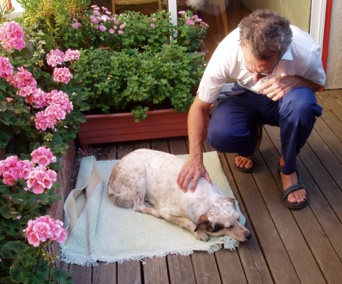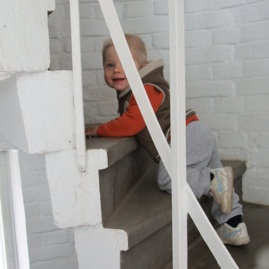responsibility is not obedience


“Only if parents and teachers respect themselves is possible for them to respect theirs children and students and not deny them in their recursive interactions with them. Only when the parents and the teachers accept themselves, is possible for them to accept both their children and their students and not deny them in a recursive devaluation of their being. Only if parents and teachers respect and accept themselves is possible for them to trust, respect and accept their children and students, and correct what they do and not deny them as they do so, inviting them to reflection in the openness of awareness. But for that to happen, most teachers and parents must be reeducated in the biology of love, so that they recover self-love, self-trust and self-acceptance, in the awareness that they themselves and the children have all that they may needed for education to be a joyful, spiritual, intellectual and aesthetically wonderful manner of living in which children can become happy and socially responsible human beings. That is a big task, no doubt, but as we attempt it, let us be aware that there is a particular practice that can help us: let us not correct the being of the child, only his or her doings, inviting him or her to reflect and act in awareness of what he or she does, in selfrespect and not in obedience.”
Maturana, H.R. 1997 Morals and Ethics in Education
obedience
Obedience is conceding to a demand in order to conserve something else that one considers more important. Thus a child will eat some food he does not like in order to be able to have the dessert. An adult will do something he or she does not want to do if the consequences of not doing it appear worse than the imagined consequences of the compliance. Resentment tends to smoulder when demands for obedience are made.
However serious the situation, there is always some point at which refusal becomes the better option. The child might refuse the spinach even if that means no dessert, and the adult may accept death rather than being forced into some heinous act.
There is no power without obedience.
social behaviour is not obedience
Consider the series of enactments in the video.
Is Naomi being “obedient” when she responds cheerfully to her mothers request? What about when they begin to negotiate, and come to some collaboration that takes both of their circumstances into account? At what point does the request become a demand, and the interaction between Naomi and her mother become one of obedience? What power is the mother relying on? What is Naomi implicitly conserving when she concedes? And what is she giving up when she refuses, and acts on the “human right” of absenting herself from an unacceptable situation?
“be responsible!”
How often have you heard the admonishment “Be responsible!” And have you noticed that this usually means “Act in the manner that I deem appropriate in this situation.” In other words, so called “responsible behaviour” is often a covert demand for conformity. In a patriarchal culture responsibility is generally accepted as compliance to the implicit rules of the culture, and these are reinforced by authorities, both explicitly vested and implicitly assumed. Responsibility is neither obedience nor conformity to norm.
“I once talked abut my view that power is granted through obedience. Nobody posses power, I said, but they are given power by others who subject themselves and do what is demanded of them. I had come to the lecture with a very realistic toy gun. “With this gun,” I said to my students, “I can kill you.” I pointed at a female student and said: “Stand up, or I will shoot you!” She stood up alhtough she knew, of course, that I would never shoot her. - “Come to the centre of the room!” She went to the centre of the room. “Lie down on the floor!” She lay on the floor. - “Take off your clothes!” At this moment she jumped up and shouted: “No! That I will not do!” I waited for a moment and then said: “You see, this refusal to obey has robbed me of my power. My power rests on your willingness to obey, and not on the fact that I am waving a gun about.”
evoking reflection on the nature of obedience
In the book “From Being to Doing” (p. 176) Maturana describes how during the Pinochet regime he was able to conduct lectures that evoked an ability to reflect in his students.
generative understanding
This description, and other similar stories, have led me to develop a variety of activities that not only evoke reflection but offer a dynamic as an isophor for the notion that I am inviting others to generate through their own engagement and reflection.
I have used the “gunpoint” scenario quite effectively in class; though of course I do it not as Maturana, but as myself, according to my version of of a stickup. I briefly step out of the classroom, and re-enter wearing a “disguise” of wig and funny glasses, wave a plastic gun, and loudly ask for a particular student by name, as if I were coming in to arrest him or her (the “victim” can be either male or female, the same series of responses ensues). The action always unfolds as Maturana describes, though it usually ends in gales of laughter.
What is most revealing for everyone in the class is the conversations that follow this, the reflections as seen from multiple perspectives.
It also means that obedience and responsibility are not commensurate. It means that without autonomy we cannot be responsible. Without autonomy there is only obedience.
I like to add to this the understanding that without love we cannot be caring, as without love we cannot see the other, we see only ourselves reflected. Thus we can begin to think about what it means to be socially responsible and to act in an ethical manner.
responsibility
What is common in all the circumstances that we discern responsible behaviour? What can be abstract or educe as the core dynamic that is present in any situation.
A child given a new toy might destroy it while playing with it. If the child didn’t know this would happen, he made a mistake. If she knew it might happen, and chose to play that way anyway, and when it broke accepted that as the consequence of her experiment, she was being responsible. If the engineer does not consider her training and ignores some calculation so the resultant structure fails, she was being careless. If he decides that the implied risk of failure is miniscule and acceptable, he is accepting responsibility for his action.
People who engage in dangerous sports can thus be either responsible or foolhardy; it depends on the “how” not the “what” of their doings. Of course, people are often unable to visualize the extended consequences of the risks they undertake.
This means that responsibility is not necessarily caring or ethical. That has felt a little difficult to accept, until I realize that the other dimension I wish to add is indeed orthogonal to responsibility, namely acting in care of the other, either through an understanding of a norm, a sense of personal conviction or duty, or - as I would prefer - through love and care for the wellbeing of others as well as oneself.
“Responsibility is acting in the awareness and the acceptance of the consequences of one’s actions.”
HMR, paraphrased


If we give another person “the responsibility” for something, we have to be prepared to accept the consequences. In other words, we are then responsible for having delegated the doing.
For example, if I ask someone to care for my dog when I am away, I will naturally choose someone who not only likes the dog, but also who I believe is competent and dependable. There is an explicit or implicit acknowledgement of both competence and honesty when the other accepts “the responsibility”.
Just the same, if I have made the wrong choice, and the dog suffers, I have to accept that.




photo Steven Rathwell
responsible flow

photo River Meyer

photo Parker Cook

